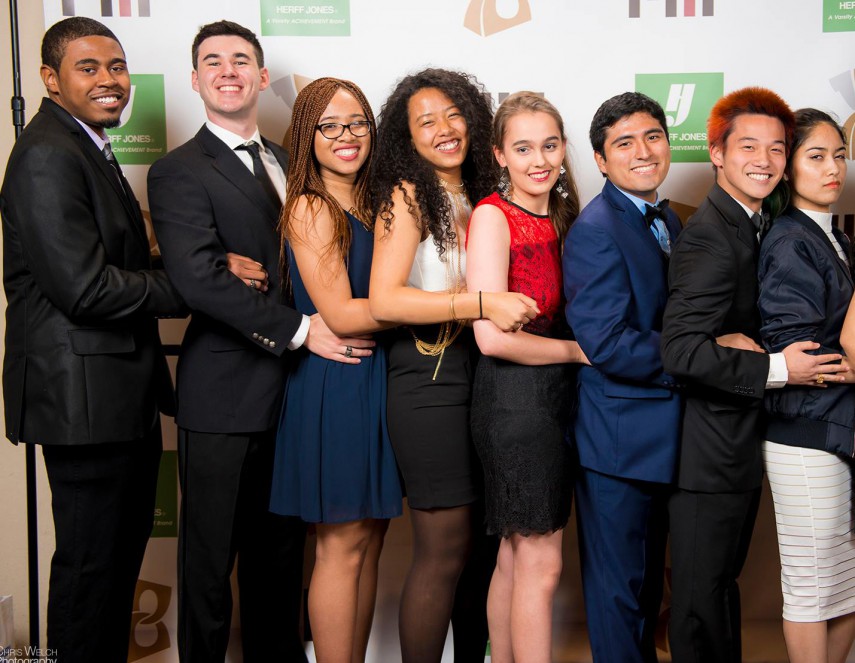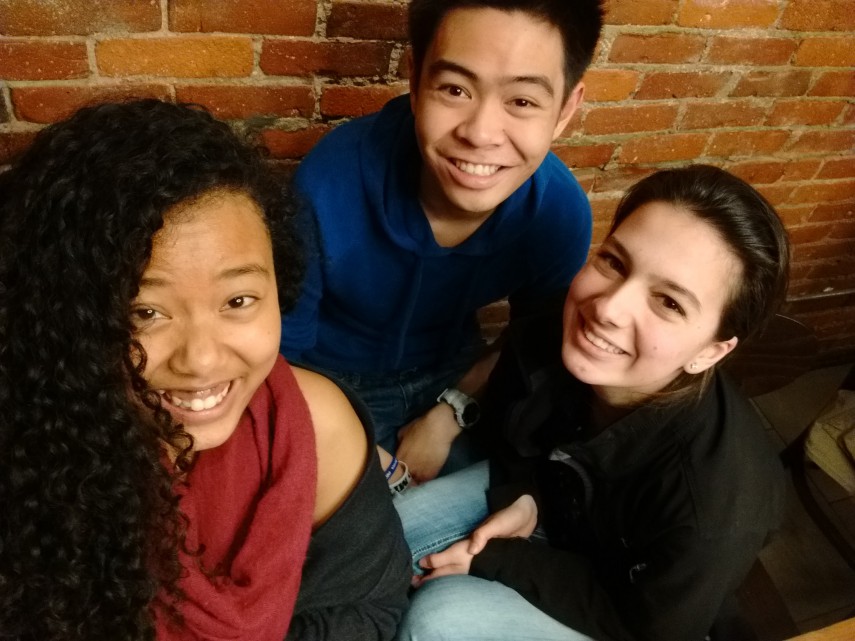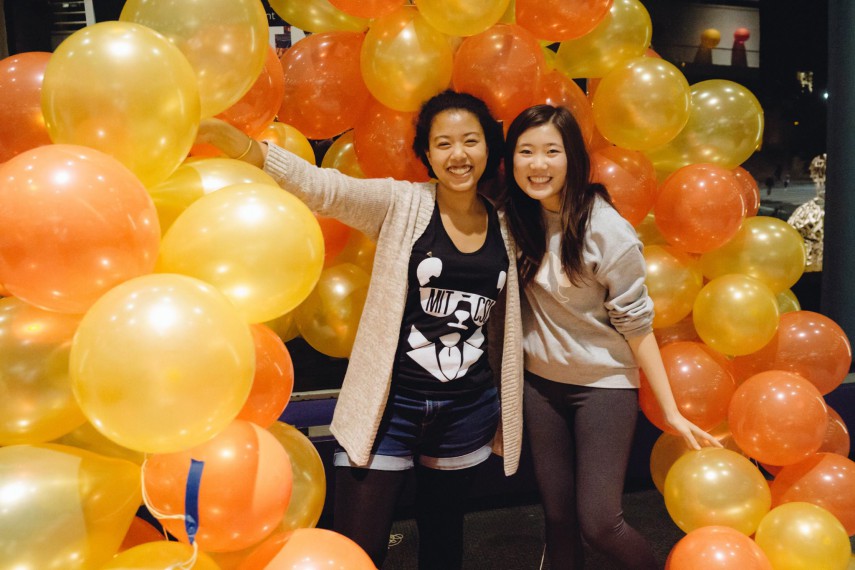How to Make Friends by Selam G. '18
Disclaimer: Attempt at your own risk
For whatever reason, I’ve been getting a lot of tumblr questions lately about making friends. People asked me how to make friends in college, in high school, in general, if freshman orientation is clique-y like CPW seems to be, confessed that they are intimidated by such a new environment, and many other concerns. I’ve even received a few questions from fellow MIT students this year, asking how to make better, more meaningful friendships, or be friends with more people, when they feel too isolated or introverted to make friends.
These questions were hard to answer, because I’ve actually never really thought about making friends as a deliberate process. I sort of felt like I just ran into people as I went about my life, and some of them happened to be people I really “clicked with”, and we became close. When I started trying to think about how I really became friends with all my friends, particularly my close friends, I realized that yes, a lot of it was due to having a more outgoing personality. But it wasn’t inherent, in that, it was due to things everyone else can pretty easily do, too. I just happen to like doing them a lot.
When it comes to simply making friends in general, I’d say that it does require effort. You have to create opportunities to make friends, with the understanding that you’re not doing it because you particularly want something out of someone, but because you enjoy sharing a human connection, that you want to give as much as you’d like to receive. How do you create opportunities? Well, you do have to leave your room and do things (I know, shocker) but it doesn’t have to be huge and intense and difficult. I moved dormitories this year, and actually didn’t know anyone in House 4 of New House. I became friends with the people in House 4 because I walked into the lounge and introduced myself–that’s a way to create an opportunity. I then would often walk into the lounge and say hi to whoever was in there, ask what they were up to, strike up conversations. The first few times were admittedly not easy–when we’re around people we don’t know that well, we tend to be on alert, and it’s easy (especially when psets are happening) to convince ourselves that not making the effort to socialize is our best bet. But it takes time and repeated interactions to become comfortable with people. Have faith that most people (especially around MIT as far as I can tell) are pretty friendly. House 4 certainly is! They were very open and made me feel very welcome. Now, I can’t believe I’ve only known them for a year. It always feels like longer.

Thanks to (from left to right) Kris W. ’18, Alex P. ’18, Sarah A. ’18, Karia D. ’18, Kevin L. ’18, Alex M. ’18, Megan P. ’18, and Anika Y. ’18 (not pictured) for making House 4 feel like home~ :)
To create opportunities for friendship, you have to put yourself out there in a lot of small ways. You have to sit in the lounge and talk to people, ask one of your classmates if they’d like to study together, make the effort to eat lunch or dinner in the dining hall with someone new, go to a study break or other events and introduce yourself to people. And then, to become friends (rather than just acquaintances) with people, you have to have these interactions repeatedly.
When it comes to making closer, more intimate friendships, I will say two things, one is that admittedly part of that formula is random and uncontrollable, and another is that it still requires effort. Becoming close with someone also takes time and repeated interaction, with an emphasis on repeated interaction. But the types of interaction you have are important. I study together with a lot of people a lot of the time, but the people I consider my closest friends I sometimes see much less often during the week. My friend Kevin P. ‘18 and I are very close, and while we hang out a lot, sometimes a week or two will pass without us seeing each other. But whenever we do hang out, it’s often off campus, and we tend do stuff together (often with my other good friend, Andreea M. ‘18) that’s a little removed from the academic life of college. Once during freshman year, I was tired from the week and taking a nap in my room, but Kevin really wanted to go to Chinatown. He proceeded to wake me up by blasting loud, traditional Chinese music from his phone and get our other friends to almost drag me out of my lofted bed in Simmons until I agreed to go on this adventure with them. It was a lot of fun, and we ate some great sushi, and that’s now a story we laugh about often. But before I agreed to go, I was feeling stressed and thought I wouldn’t have the energy or the time. Making close friendships means making the effort (like Kevin did) to invite your friends out to do things (perhaps not quite so obnoxiously depending on how close you are already) and, on the flip side, making time in your busy life to say yes to those invitations, or sincerely reschedule hang out time if you can’t make it.
However, that Kevin, Andreea and I are such good friends is not only because we put in effort, but also because we want to put in that effort, and we really enjoy hanging out with each other. That part really is kind of random and up to God, the universe, whomever you believe is responsible for the vicissitudes of life. One of the things I like so much about MIT is that so many incredibly different people are close friends. Kevin is a Filipino-American guy from Alaska, Andreea is a Romanian-American girl from Florida, and I am a Chinese-Ethiopian-American girl from Colorado. There’s a lot of things that are really different about us, and no particular reason that we should be friends, other than the most important reason of all–that we have similar values and we all support each other. “If it weren’t for all getting into MIT,” Andreea mused to me once, “there’s probably no way we’d have met. Isn’t that weird?”
Kevin and Andreea agreed to take a selfie with me specifically for this blag post (true frandship!). We’re kind-of-not-really-working in the Starbucks on Boylston St. in Boston.
So, the only suggestion I can give in helping others find their closest friends is simply to again create more opportunities for getting to know people, which increases the likelihood of running into someone who you really “click with”, someone who has that quality we can’t quite rationally define. And when you do find those people, really put in the effort to hang out and keep in touch.
When it comes to being a wide-eyed froshling (freshman) at MIT (or any other college), the best advice I can give you is don’t worry and don’t freak out, although to some degree everyone freaks out a little bit and that’s normal. Going to college is a lot of adjustment! So many new people to meet, and a completely new place to live and have to know your way around. Often, it’s the first time really having to start from scratch when it comes to making friends since middle school or high school. It gets better. You’ll meet a lot of people all at the same time during freshman orientation, but slowly, it will become apparent who your friends are, or even who your potential friends are. Don’t worry if it takes a while–you didn’t become close with your high school friends overnight either. When people say “take advantage of pass no record”, in my opinion that means taking some time away from your school work to really meet your fellow classmates and become friends with them. Having a social support network is very important in college. If you feel up to it, join clubs and student groups too! (Shameless plug: all of you should join MIT Chinese Students’ Club when you get here, as well as the Ethiopian-Eritrean Students’ Association!) A lot of them are lots of fun, fulfilling, and provide both an opportunity to meet people and to do something that’s not school, which is important (just be careful not to overload yourself). Also, don’t think that your old friends aren’t still incredibly important. I keep in touch with my high school friends through various group chats and this other really cool thing where we rotate mailing a journal to each other**.
My friend Amber G. ’18, who I met through MIT Chinese Students Club (the tank top there says MIT CSC). We have a tradition of taking at least one photo together at every single CSC event.
And, for a couple people who have asked me the hardest questions about friendship on tumblr, when it comes to making friends in an environment where you dislike most of the people, I can only say it is worth it. I didn’t like many of the people in my middle school and high school in suburban Colorado, and actually did experience many instances of bullying, racism, and classism from my classmates. In middle school, I made maybe 8 “friends” initially, one of whom is still a close friend today. The other 7 of them, unfortunately, were horribly mean girls who bullied me, and obviously I don’t consider them my friends anymore. 1 out of 8 are terrible odds, particularly when it’s not “I made friends with 1 out of 8 people”, it’s more like “7 out of 8 people treated me horribly”. It would make you feel (as it made me feel for a while) that it isn’t worth it to try making friends. But I still think it was worth it to have met that one person, Ruby W. ‘18 at Colorado School of Mines, for whom I would deal with the other horribly mean girls all over again, many more times. She is one of few people I can honestly say I would walk through hell and back again for.
Friendship isn’t about quantity. We don’t measure it in odds like 1 out of 8 or by how many Facebook likes we get or how many people we Snapchat. Like I said in an earlier paragraph, friendship is when you want to give as much as you receive from someone else, and sometimes, you are willing to give a lot more than you receive. You do that when your closest friends are in a bad place, when they might even let their stress out on you at times, but you still make the effort to spend time with them and help them get through whatever it is they’re going through, or help them become better people. My friend Mikael M. ’16 is one of the few people who’s openly criticized many of my habits and things I’ve done, and I actually appreciate that a lot. He’s helped me see things I couldn’t see in myself, and helped me become a better person. I am glad that he can be honest with me, and that I can seriously consider what he says, in mutual respect.
Maybe, like some sociologists would argue, you give and receive nothing at times because of some imagined reciprocity, because hypothetically they would do that for you too. Even if that’s the real motivation for all of our actions, I take comfort in the fact that few people really think about that consciously on day to day basis. In their heads at that moment, they honestly do it because they love you. It’s the search for that type of connection that’s driven people to look for friendship, that I suppose caused so many people to ask me these questions on Tumblr. I think, if you have that sort of motivation, and you put in a little time and effort, you’re sure to find people who will become your friends. I won’t say that you’ll find lots of them, and that’s really not the point. But though you might not make friends with 8 out of 8 people, you might make the 1 out of 8 that matters, the 1 who is worth 8, or 800, or 8,000.
And that’s the point.
“Let me tell you about love, that silly word you believe is about whether you like somebody or whether somebody likes you or whether you can put up with somebody in order to get something or someplace you want or you believe it has to do with how your body responds to another body like robins or bison or maybe you believe love is how forces or nature or luck is benign to you in particular not maiming or killing you but if so doing it for your own good.
Love is none of that. There is nothing in nature like it. Love is divine only, and difficult always.”
–Toni Morrison, Paradise
You can read my some of my more extensive responses to friendship questions on tumblr at the following links:

